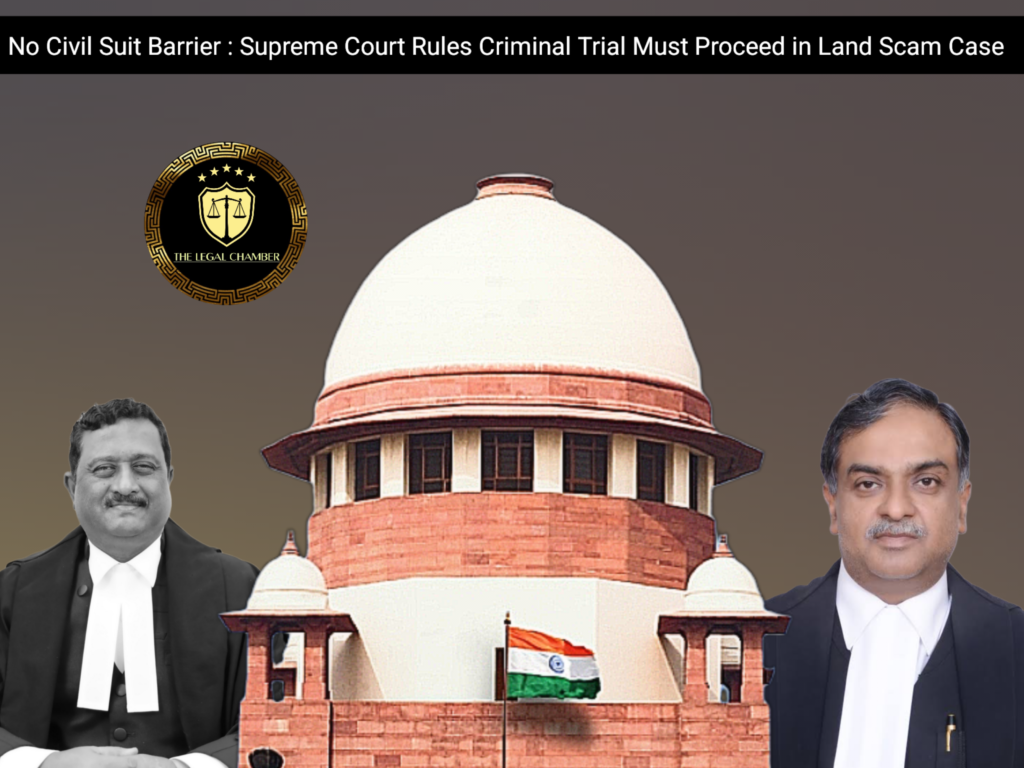
The Supreme Court held that the High Court erred in quashing criminal proceedings under Sections 120B, 415, and 420 IPC against respondents for allegedly fabricating a partition deed and family tree to exclude daughters from property compensation. It ruled that pendency of civil suits does not bar criminal prosecution if a prima facie case exists. The Court emphasized that criminal conspiracy and cheating must be tried independently, reinstating the trial court’s proceedings. The judgment reaffirms that civil and criminal remedies can coexist, ensuring accountability for fraudulent deprivation of property rights.
Facts Of The Case:
The case revolves around a dispute over compensation amounting to ₹33 crores awarded by the Bengaluru Metro Rail Corporation for ancestral land purchased by K.G. Yellappa Reddy and his wife. The appellant, Kathyayini, one of their five daughters, alleged that her brothers—Sudhanva Reddy, Guruva Reddy (deceased), and Umedha Reddy—along with Sudhanva’s sons (respondents Sidharth and Vikram Reddy), conspired to exclude the daughters from their rightful share. They allegedly created a fraudulent partition deed (2005) and a false family tree (2011), bribing a village accountant to omit the daughters’ names. Using these documents, the brothers claimed the entire compensation, receiving ₹27 crores. The fraud came to light when Sudhanva Reddy, after a fallout with his sons, disclosed the forgery to authorities, leading to a partial freeze on payments. Kathyayini filed criminal complaints (2017), resulting in FIRs for cheating, forgery, and criminal conspiracy. Though the trial court initiated proceedings, the High Court quashed them, accepting the Sub-Registrar’s unverified claim that the partition deed bore Yellappa Reddy’s thumb impression. The Supreme Court overturned this, noting prima facie evidence of fraud and ruling that pending civil suits for partition don’t bar criminal trials. The case underscores the interplay of property rights, gender equity, and the independence of criminal proceedings.
Procedural History:
The case originated with two criminal complaints filed by Kathyayini in 2017 (FIR Nos. 270/2017 and 145/2017) alleging fraud and forgery by her brothers and nephews to exclude her from a ₹33 crore land compensation. The police filed charge sheets in 2021, leading the Trial Court to take cognizance and issue summons (C.C. Nos. 892/2021 and 897/2021). The accused challenged this before the Sessions Court and High Court, which initially upheld the freezing of their bank accounts under CrPC Section 102. However, in 2023, the High Court quashed the criminal proceedings, accepting the Sub-Registrar’s unverified statement about the partition deed’s authenticity. Aggrieved, Kathyayini appealed to the Supreme Court, which in 2025 reversed the High Court’s decision, ruling that the criminal trial must proceed independently of the pending civil suits. The SC emphasized that prima facie evidence of forgery and cheating warranted a full trial, reinstating the case before the Trial Court.
READ ALSO :No Narco Test Without Consent: Supreme Court Cites Constitutional Rights
Court Observation:
The Supreme Court made several critical observations while overturning the High Court’s decision. It noted that the High Court erred in relying solely on the Sub-Registrar’s untested statement about the partition deed’s authenticity without cross-examination. The Court emphasized that a prima facie case of criminal conspiracy (Section 120B IPC), cheating (Section 420 IPC), and forgery (Sections 463/464 IPC) was clearly established through the fabricated family tree and partition deed that excluded the daughters from compensation. Importantly, the Court reiterated that pendency of civil suits for partition cannot act as a bar to criminal proceedings when independent offenses under penal laws are disclosed. The judgment underscored that civil and criminal remedies can proceed simultaneously, particularly in cases involving fraudulent deprivation of property rights. The Court also observed that the respondents’ deliberate misrepresentation in official documents and subsequent appropriation of compensation funds revealed a clear criminal intent warranting trial.
Final Decision & Judgement:
The Supreme Court allowed the appeal and set aside the High Court’s order quashing the criminal proceedings. It held that the Trial Court must proceed with the criminal cases (C.C. Nos. 892/2021 and 897/2021) against respondents Sidharth P.S. Reddy and Vikram P.S. Reddy for offenses under Sections 120B, 415, and 420 IPC. The Court ruled that the alleged fabrication of the partition deed and family tree, coupled with the wrongful appropriation of compensation money, disclosed sufficient prima facie evidence of criminal conspiracy and cheating to warrant a full trial. Rejecting the argument that pending civil suits barred prosecution, the judgment affirmed the independence of criminal proceedings in cases involving penal offenses. The Court directed the Trial Court to conduct proceedings in accordance with law, ensuring justice for the appellant and upholding the principle that fraudulent deprivation of property rights must face criminal scrutiny irrespective of parallel civil remedies.
Case Details:
Case Title: Kathyayini vs. Sidharth P.S. Reddy & Ors. Citation: 2025 INSC 818 Criminal Appeal No.: (Arising out of SLP(Crl.) No. 1105 of 2024) Date of Judgment: July 14, 2025 Judges/Justice Name: Justice Vikram Nath & Justice Prasanna B. Varale
Download The Judgement Here